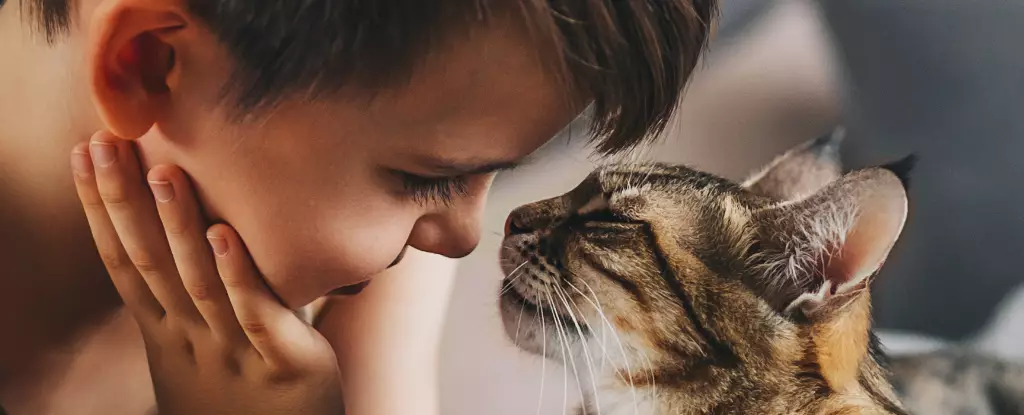Cats have long held a unique position in human society, transitioning from mystical creatures worshipped in ancient cultures to beloved companions in modern households. Their presence in our lives goes beyond mere entertainment; they offer emotional support, companionship, and even some health benefits. Yet, this relationship is not without its complexities. This article delves into how living with cats can affect our mental and physical health and explores both the positive and negative implications of owning these enigmatic creatures.
Unlike other pets, the bond between humans and cats is multifaceted. Studies have indicated that many cat owners perceive their feline friends as integral family members rather than simple pets. An investigation involving 1,800 Dutch cat owners highlighted this sentiment—over 50% of respondents considered their cats a part of their family, while a significant proportion likened their bond to that of a parent and child or best friends. The degree of emotional investment in these relationships varies significantly, with those who describe their connection as co-dependent reporting stronger emotional ties to their cats.
The dynamics of these relationships reveal much about human psychology. Owners often derive emotional satisfaction and a sense of purpose from caring for their pets. This nurturing instinct is illustrated further by findings that suggest cats can discern human emotional cues, and some even modify their vocalizations to elicit nurturing responses from their owners. While these adaptions highlight the intelligence of cats, they also underscore the emotional complexity of their relationships with humans.
Research indicates that owning a cat can offer various health benefits. Owners have reported decreased feelings of social isolation, likely owing to the companionship that cats provide. This emotional connection can manifest in tangible health advantages, such as lower risks of cardiovascular disease. Several studies have suggested that pet ownership, particularly of cats, correlates with reduced risk of heart attacks and strokes. Nonetheless, it is crucial to remember that correlation does not imply causation. The social context, lifestyle habits, and other factors may also play significant roles in these health outcomes.
Additionally, cat ownership appears to have a favorable impact on psychological well-being. Interaction with cats—be it through play or simply petting—can stimulate the release of oxytocin, the “feel-good” hormone, promoting feelings of relaxation and happiness. In short bursts, such as during a two-hour interaction, people have reported decreased symptoms of anxiety and depression.
However, the emotional health of pet owners isn’t uniformly positive. Qualitative research reveals a complex picture; some individuals feel their mental well-being is directly tied to their pet’s condition. In a study involving veterans, respondents indicated that their cats provided critical emotional support, helping them cope with issues like anxiety and depression. Yet, a significant number of these same individuals also described high levels of caregiving burden when their pets experienced health issues, indicating that the relationship can become overwhelming.
While cats can provide companionship and health benefits, they also come with potential risks. For instance, studies have identified zoonotic diseases, like toxoplasmosis, that cats can transmit to humans through their feces. For pregnant women and others with weakened immune systems, this risk is particularly concerning, as the infection can lead to serious complications. To minimize such risks, experts recommend strict hygiene practices, including daily litter box cleaning and the use of gloves.
Moreover, allergies to cats are increasingly common. Cat saliva, fur, and dander can trigger allergic reactions in sensitive individuals. Though it is possible for people with mild allergies to coexist with cats using regular cleaning and hygiene measures, the prevalence of allergies suggests ongoing challenges in maintaining a cat-friendly household.
Interestingly, there is some evidence of a paradoxical effect: while cats can exacerbate allergies, exposure to cats during childhood may help fortify the immune system against asthma and other allergic conditions. This duality highlights the nuanced impact that cats can have on human health.
The relationship between humans and cats is a multifaceted tapestry woven with affection, responsibility, and sometimes health risks. Cats contribute significantly to our emotional and psychological well-being, offering companionship and support, but they also introduce a set of challenges that pet owners must navigate. Understanding both the negative and positive aspects of cat ownership enables individuals to foster healthier relationships with their pets while minimizing potential risks. As we continue to explore this unique connection, it becomes increasingly clear that our feline friends are not just pets; they are remarkable companions that significantly influence our lives—both for better and for worse.



Leave a Reply